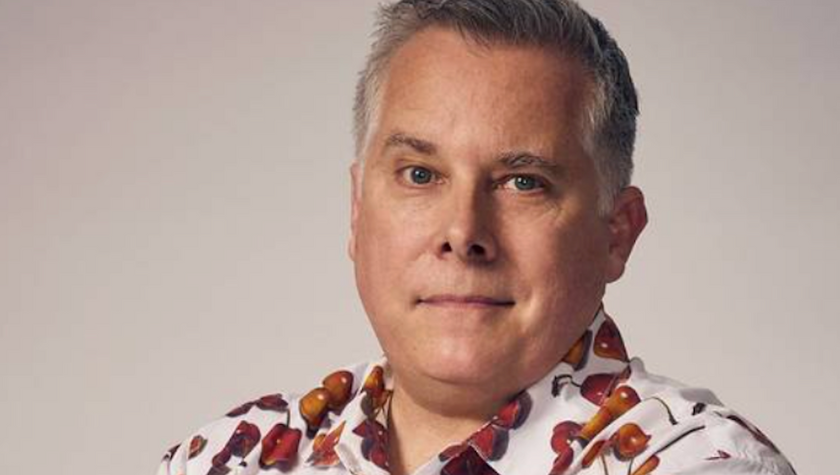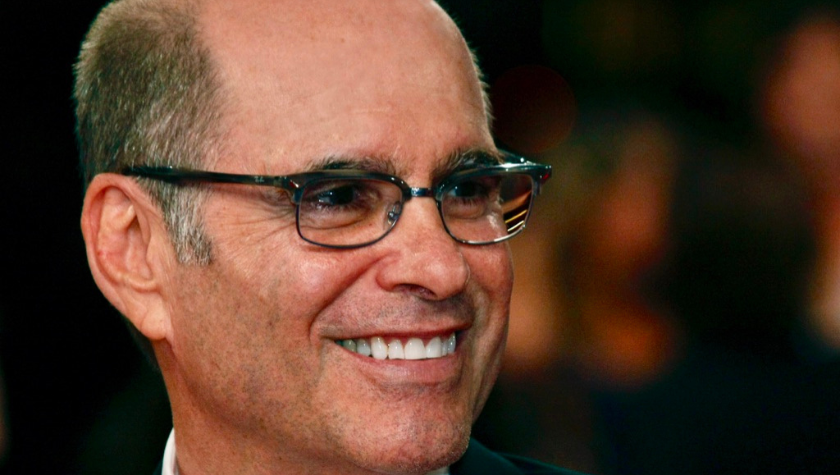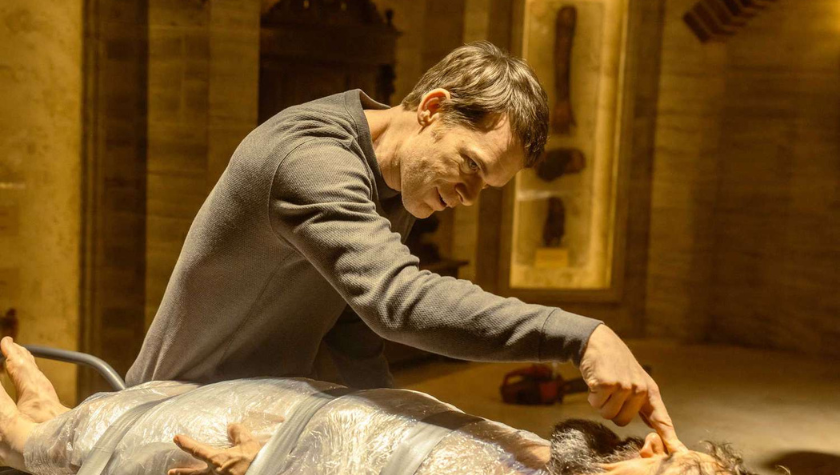Gearing up for a second season of Dexter Resurrection, showrunner Clyde Phillips and producer/writer Scott Reynolds discuss with Final Draft writer Liz Thompson what makes Dexter - and themselves - tick.
With Dexter Resurrection getting an official season 2 pickup, let’s dig right into what inspires you both as writers and creators. Do you have a favorite book? Something you love to recommend or gift to others?
CLYDE: For me, it was a play that changed my life, Death of a Salesman. That’s a play that I read overnight at the UCLA library after they were closed, and I had to sneak my way out. That changed my life, and that made me want to be a writer.
What about the play stuck with you the most?
CLYDE: After I read it, I went and saw the play, and the way they figured out the lighting in the rooms and everything was just brilliant, but it was the intensity of family and the flawed father — I grew up in a very flawed-father household — that blew my eyes open to the possibility of what can be experienced, and how experience can be shared through writing.
Flawed fathers seem like they’re the heartbeat of every Dexter series, sequel, and prequel. It’s explored in so many different ways.
CLYDE: We look at Dexter as several things, a serial killer show, but also a father-son show. That’s a very big theme in the show as a whole but especially in Resurrection. We all have father-son issues. I more than most. And we also see this as a funny show. And because of the voiceover, he’s relatable, he's vulnerable. You understand what he's going through. He's not Ed Gein. He's not Jeffrey Dahmer. He's a living, breathing, human being with problems, decisions, and some regrets, trying to make the best of his life and be in his son’s life.
SCOTT: Especially this season, this was an opportunity to let Dexter become the dad that he wanted to be for his son. Instead of looking at his son and saying, “You're going to become just like me,” like a mirror. It's one of the things that Michael had noted about New Blood – that Dexter was just looking at Harrison like he was a mirror, and thinking “How can I shape him in my image?” And in Resurrection, this was a father who was like, “All right, he's not going to be like me. How can I help him be the thing that he's supposed to be?” Which is more of a proper fatherly approach.
CLYDE: Everything Scott said, but also on top of that, in the first episode of Resurrection, our audience and Dexter think that Harrison is carrying that fated gene as he kills the roofie rapist. But Harrison did not like that experience. And when someone tells him “You did the right thing, you stopped this.” Harrison says, “No, doing the right thing and stopping it would have been calling security.”
SCOTT: Dexter could have stayed on his path, but he chose not to, for the benefit of his son. And that's a sacrificial thing that he has done. So we get to see him all throughout the season, stepping up for Harrison in a way that heretofore, we've never seen. Previously in Dexter’s relationships, we’ve seen him choosing what he wanted to do, his urges, his hunger, and here he chooses a harder path.
Dexter’s relationship with his father has also evolved in Resurrection.
CLYDE: Before, to use Scott's word, Harry was a scold, and now they're more equals. Dexter's had this near death experience and Harry is not bossing him around anymore. Dexter knows what he wants now. But we can't forget either that Harry is not a real person. Harry is this corner of your brain that says, “You know what, maybe I shouldn't have that second ice cream…”
SCOTT: And Dexter has a different need for Harry this time around. Before, it was always about the code. Everything was about controlling this beast that is within you. And this season, because of what we were talking about with Harrison, Dexter needs Harry the father, not Harry the code master. Not Harry the control-your-animal-inside. And like Clyde was saying, it did allow for much more real conversations. There's much more back and forth, it really ignited those conversations between Dexter and Harry.


Scott, what book would you recommend?
SCOTT: The first thing that came to my head, are the Richard Stark novels. That whole series of Parker crime novels. It’s very Dexter-related in some ways. It's this guy that lives by a code. He's a master thief, and he's got a sense of morals. It's Donald Westlake writing under his alter ego. And there's not a sentence more than 10 words. He doesn't use adverbs. It's just very clean and crisp and precise, funny, a great cast of characters. I just love the Parker books. I've read all 29 of them probably four times.
CLYDE: It’s a little bit of a parallel in the writing between that and Cormac McCarthy in that they're not loquacious.
Have you read Peter Falk's autobiography? Every chapter is about one to three pages. He tells very short stories.
SCOTT: You probably hear his voice as you read it.
Absolutely. He starts a story, and then it's basically over. It’s great.
CLYDE: I do that too. I write novels as well. I've written four of them, all bestsellers, and my chapters are short and energetic and page turning.
SCOTT: Clyde’s books are great — Detective Jane Candiotti. She's a great character.
That’s good to know - something to hold us over until season 2 of Resurrection comes back! Do you have life mottos or worldviews that you live by?
SCOTT: Well, if you're talking about mentorship, that’s a great one. I was Clyde’s assistant 25 years ago, and he brought me up. He was my mentor. He helped me become the writer that I am today. He's the greatest showrunner, and the thing that he puts out there on all of his shows is “be kind.” We are so lucky to be able to do this for a living that we should not be assholes to other people. There's no excuse for that. Even if things go wrong, you can still be kind. And I abide by that, too.
CLYDE: Kindness, in a non-religious, just humanistic sense, is the easiest thing in the world. In the writing room, if somebody's having trouble with something, there's no scolding. There's no making anybody uncomfortable. It’s just “How do we take this problem and make it work?”
CLYDE: Another thing that’s important in the room or in life, or in a marriage or whatever, is listening. You don't have to be right. And everybody deserves to be heard. And if people say something that's completely out of context, we'll slow down and say, “Well, wait, why'd you say that? What's the note behind what you just said? Because what you just said makes no sense, but something in your thought process got you here. So help us understand that.” We may then say, “Great, stupidest fucking idea I ever heard,” or “Let's work on that.”
CLYDE: We tend to have large writing rooms. We have 10 people in a room. And part of that is because we have a very successful legacy show. In fact, it just came out recently in IMDb’s top 250 TV shows of all time. Dexter Resurrection is number 17, and the original Dexter is number 134.
Wow. Congrats!
CLYDE: I’m saying that because we're such a successful legacy show that nobody's going to give me shit about how many writers I have in the room. It's the cheapest money you spend, on the writers, and that's where all the magic happens.
Speaking of magic on sets and in rooms — the casting and writing for New Blood, Original Sin, and Resurrection are pretty unique. Like having Prater discuss the necessities of having a wheelchair ramp for the stage, a very real-life pain in the butt issue for wheelchair users. And you not only cast disabled actors in your show, and staff disabled writers in your rooms, but you also are having these real world conversations about ableism on screen. It’s refreshing.
CLYDE: I sit in every production meeting and talk to the casting directors and the ADs and tell them I want disabled people in any crowd shot. I’ve been doing this my whole career, over 15 series. I’ve always wanted disabled people on the shows. I don’t have any personal experience with that, but it’s just kindness and the accurate representation of what the world or a crowd actually looks like.
SCOTT: It’s how I grew up, too. My parents adopted and foster-parented kids. We had 33 foster kids come through our house when I was growing up, including some special needs kids. So I have two down-syndrome brothers, I have another brother who’s mentally handicapped, I have a sister with cerebral palsy, I have two Deaf sisters. It’s just normal to me, so it’s great working with Clyde because he wants to include that in Dexter’s world because it is part of the real world.
How do you guys procrastinate?
CLYDE: I don’t.
SCOTT: For me, that's a big part of my greater process. I used to feel bad about not getting things done, but now when I’m working on something, I'll just step away and feel great about it and go do something else. Go to a movie or listen to a record or go for a walk with my dog or my wife. Just relax the brain. And then all of a sudden, these ideas just sort of filter in.
I like to label everything I do as writing, because if everything is writing, then I can’t possibly ever be procrastinating.
SCOTT: Exactly. I’ve been married for 30 years now. And there were times if I’m writing at home, that I would just be sitting and looking out the window. And my wife or my kids would come in and be like, "Hey, can you come help me do this thing?" And after a while, they finally understood that, "Oh, no, actually, I'm writing right now." It doesn't look like I am. It looks like I'm walking around looking out the window or whatever, but like you're saying, it's just part of it.
CLYDE: I have the same thing here on the island, there’s always someone knocking on my door saying “Hey, let’s go do something,” and I say “You’re retired, you’re on vacation, but I’m working.”


So many EPs I’ve interviewed have a story about THAT MOMENT when their partner or kids had to learn about the process, because it doesn't look like we're always working, even though we are. Is there a fictional character that you've written for that you personally feel is the closest to you?
CLYDE: I had a really difficult childhood. It comes out in all my writing, in all my characters. It's in my books, it's in scripts, and it's all the father and son stuff. So I can't narrow it down to one, because it's everyone.
It’s so tempting to just think about which of our characters represent the best or most fun versions of us, but to really acknowledge that so much of you is in your characters, the tough stuff and the fun, to see yourself in all of them, every part of them, is really great.
CLYDE: The lead character in my novels is a woman, and I was at a book event and somebody asked me, “Who did you draw upon to write how deeply you go with this character, Jane?” And I said, "She's me."
SCOTT: For me, it would be Dexter or Batista, probably. With Batista, it’s about the way that he just loves life, wants to do things, wants to experience things. For Dexter, I was a writing assistant on season one. So I’ve been on this thing the whole time, and at a certain point, we as writers start to shape Dexter in our image a little. The asides that he thinks.
SCOTT: I think why we love Dexter so much, is that his character has this eternal optimism. And each season of Dexter is kind of simple. We have a very simple idea of what we're going to do. You know, season one is “Can he have his brother in his life?” And that didn't work out. Season four is asking that question "Can I have a family?” And clearly that doesn't work out. Then it’s “Can I have a best friend?” That doesn't work out. Season six with Travis Marshall and Brother Sam. “Can I believe in something bigger than myself?” No, you can't, but he can still try. We even talk about that in episode nine of Dexter Resurrection. It's his eternal optimism in the face of all this darkness, that’s what makes us love and connect to this guy.
Is there anything you guys wanted to do on the show but you've gotten a note that you couldn't?
CLYDE: There was an episode in New Blood that we would have liked to do. We wanted more kills. New Blood was initially about abstinence, but then you have to come out of that, and make it an exciting serial killer show. So we’d planned two additional kills. There weren't many kills on the show otherwise. But the network didn’t want to do that. That was probably the biggest one for me.
How about favorite notes?
CLYDE: We had the whole show worked out for Resurrection, and then we got a call from Gary Levine that added in the whole ‘Blessing’ thing. That came from him.
SCOTT: We originally had Dexter in a glass apartment, so you could see the city in the background, and Blessing was part of the story, but they didn't live together. And it was Gary who said we should put them together. There's something about the light and the darkness and the way that Dexter can always hear the life upstairs, as he's living this quiet, dark life down in the basement. It opened up the show in a really remarkable way. So we pivoted. We had great plans for this sort of high-end glass apartment building.
CLYDE: Dexter was the manager of the building.
SCOTT: We had it all worked out. And then this note unlocked something that made the show 10 times better, you know? And the other way, it would have been great. It would have worked too. But you have to be open to things. You can't be super precious.
CLYDE: Another great example of that is when we did the famous Thanksgiving episode in the Trinity season. Do you remember that? That famous line - when Trinity’s wife says something to him at dinner and he turns to her and says, “Shut up, c***.” We had written that episode, given it to the network, and done a table read on it, and then Bob Greenblatt called on a Friday night — and whenever I get a conference call from the network, I bring all the writers in and put it on the speakerphone, so that we don't have to translate the notes or whatever it is. I just want everybody to know what's important and what isn’t — and Bob said, “You know, guys, this is a really good episode, but this is a great series and good episodes aren't good enough. I know I'm asking you a lot here, and you can say no, but I want you to turn this into Tennessee Williams.”
CLYDE: This was a Friday evening, so we showed up on Saturday. It was five of us, we separated out and wrote out the scenes that we had thought about. And then the next day, Scott and I and Melissa came in and wrote the script and turned it in that night, and that's the show we made. And now it's the most memorable episode of the whole show from the first eight years. It all goes to this idea that it's never done until it's done.


Who’s a writer that you both admire, but you've never met?
CLYDE: Steven Zaillian. He wrote and directed Ripley and a number of other things.
SCOTT: Mine would be Quentin Tarantino. Back in 1994, I was in college at Eastern Michigan University, and I was working at a movie theater. I would screen the prints at midnight just to make sure they were good on Thursday nights. I was already a fan of his, but I saw Pulp Fiction and it was like something unlocked inside of me. I went home, went to my then girlfriend, now wife, Amy, and I was like, “Hey, we're gonna go to the first showing of this." I went and saw it again, and I said to her, "As soon as I graduate, I'm gonna move to LA, I'm gonna pursue this writing thing.” Because of the way that he tells story, the way he jumps around in time. He breaks all the rules, but he does that because he knows the rules.
SCOTT: My dog's name is actually Mia Wallace, so that was awkward when we were zooming with Uma Thurman for Resurrection. My dog jumped up on my lap and looked at the screen, and Clyde said "Hey, Scott, why don't you tell her your dog’s name." So that was great.
CLYDE: And our neurodivergent cop is named Claudette Wallace after her, too.
I was going to ask about that, Claudette has now joined the ranks of some pretty iconic neurodivergent-coded detectives.
SCOTT: She’s great. I went to a friend's house the other day and their daughter is neurodivergent, and she came downstairs and she gave me a hug, which is not normal for her, you know. And she said, “Thank you so much for Claudette.” Like, here's a character that there's no point made of it. It's not like we had to say it, she’s just there. She just is who she is, and it's her superpower. It's just matter of fact. And my friend’s daughter was like, “I felt seen.” That goes back to the way that Clyde likes to make a show, the way we both like to make a show. We like to have all kinds of people on it, without commenting on it.
CLYDE: In New Blood, Esther, the secretary in the police station has no legs. But what do we do? We put her in a short skirt and have her in a line dance. With her prosthetics. It's not mentioned. She's just accepted into that town.
Is there anything that you know now that you wish that you knew when you first entered a writer's room?
SCOTT: We actually have this conversation with staff writers when they step in, and remind them that they don’t have to just agree with people in the room, because that wastes time. But you also can’t be the guy who just shits on ideas. Your job is to learn how this room works. Write down your ideas sometimes, or just sort of sit with them for a second, make sure it works, and just be present in a room, because then great things will happen.
CLYDE: It’s a privilege to do what we do, and you need to make the most of the situation. I have a couple of phrases that I’ll be opening the room with in October, which is one, don't waste my time. Two, don't interrupt me. And three, write down what you're gonna say, so that you can think about it, and then decide whether or not you're going to say it.
When you pair all three of those things with your philosophy of “be kind,” you get a really powerful combo. Especially because it can be overwhelming for new writers to get in a room and not know which way is up. It sounds like you are great at setting the expectations in the room. Really setting everyone up for success.
CLYDE: It’s also important to understand that the work is never over. When we were doing New Blood, we were in post, and I was watching the footage as Dexter was going to get the guy who sold fentanyl to Harrison. As he’s walking through the guy’s home, the place is decrepit and this line popped into my head: “Hell, I should kill this guy just for his wallpaper.” I recorded it into my iPhone, sent it to the Assistant Editor, she gave it to Michael, he recorded it, it was in the cut the next day. It never ends. Just because we write “the end,” it doesn't mean it’s the end. As Churchill would say, it’s the end of the beginning. We need people in the room who understand that, too. Some new writers write “end of episode” and think they’re done, but that’s not how it works. Not in writing or in life.
This has been such a wonderful conversation. I don't want to end it, but I'm out of questions. Is there anything we haven't covered that you guys are dying to share? Any secrets to the industry?
CLYDE: It’s just, “be better than everyone else.” That's how you do it. It’s just the reality of it. I speak all over the world, and I’ll say to a room of 100 writers, “How many of you here have written the best script ever written?” And everybody raises their hand. So that's a hundred people. There are a thousand film schools in the country, so that's 100,000 best scripts ever written this year. We make 20 movies a year. Be realistic. Be better than everyone else, and find your way in. It doesn’t matter how you get in. Just get in. Anywhere you can, and then be better than everybody else, and people will notice.

